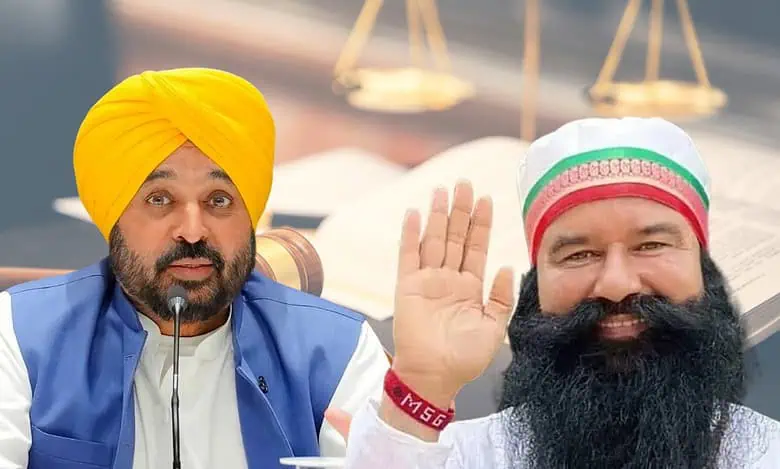
Punjab Proceeds with Ram Rahim Prosecution
Punjab CM Authorizes Prosecution of Ram Rahim Singh
On October 22, 2024, Punjab Chief Minister Bhagwant Mann gave the go-ahead for the prosecution of Dera Sacha Sauda leader Ram Rahim Singh in the 2015 sacrilege cases. This decision came just three days after the Supreme Court revived the stalled trial against Ram Rahim Singh, marking a significant development in the long-standing legal battle.
The sacrilege cases date back to 2015 and involve incidents that deeply affected the sentiments of the Sikh community in Punjab. The Supreme Court’s intervention has given the state government the necessary approval to proceed with the legal process against Ram Rahim Singh’s sacrilege prosecution.

Supreme Court Revives Trial
The Supreme Court’s recent decision played a crucial role in moving forward with the Ram Rahim Singh sacrilege prosecution. A bench comprising Justices B R Gavai and K V Vishwanathan set aside the stay that had been imposed by the Punjab and Haryana High Court, effectively reopening the trial. The apex court directed Ram Rahim Singh to respond to the revived trial and announced that it would revisit the matter in four weeks.
The Punjab government, represented by Advocate General Gurminder Singh, had earlier sought a stay on the High Court’s decision to halt the trial. The Supreme Court, considering the seriousness of the matter, issued a notice to Ram Rahim Singh. The legal developments have paved the way for the continuation of the case, which had faced delays due to legal challenges and appeals.
Background: Case Transferred to Chandigarh
In February 2023, the Supreme Court had ordered the transfer of the Ram Rahim Singh sacrilege prosecution from a court in Faridkot, Punjab, to Chandigarh. The decision was aimed at ensuring a fair trial, considering the sensitivity and complexities surrounding the case. This move was seen as a step towards addressing the concerns of those seeking justice in the sacrilege incidents.
The cases against Ram Rahim Singh involve multiple charges related to sacrilege and violence in the aftermath of the incidents in 2015. The allegations have sparked widespread protests and legal battles, highlighting the significance of the recent progress in the case.
Ram Rahim Singh’s Parole and Restrictions
During the ongoing legal proceedings, the Haryana government granted Ram Rahim Singh a 20-day parole. The terms of his parole restrict him from participating in any election-related activities or leaving the jurisdiction of Haryana. The decision to grant parole has been met with criticism from various quarters, given the gravity of the charges he faces and his previous convictions.
The parole period has added another dimension to the legal proceedings, as Ram Rahim Singh’s sacrilege prosecution moves forward. Critics argue that such temporary releases could potentially influence the judicial process, while others emphasize the importance of adhering to legal norms and procedures.
Who is Ram Rahim Singh?
Ram Rahim Singh, a religious leader associated with Dera Sacha Sauda, has a controversial history marked by criminal convictions. In 2017, he was sentenced to 20 years in prison after being found guilty of raping two of his female disciples by a CBI court. The conviction led to widespread unrest and protests among his followers.
Beyond the rape charges, Ram Rahim Singh has been convicted in two murder cases, for which he is serving life sentences. In January 2019, he was found guilty of orchestrating the murder of a journalist who had exposed illicit activities within the Dera. Additionally, in October 2021, he and several others were convicted for conspiring to kill Ranjit Singh, a former manager at the Dera Sacha Sauda.
Ram Rahim’s Time Outside Prison
Despite his multiple convictions, Ram Rahim Singh has spent significant time outside of prison since his sentencing. As of October 2024, he has been out on parole for a total of 255 days, raising questions about the legal system’s handling of his case. His parole has often been a point of contention, with many questioning the leniency shown to a convict with such serious charges.
The current focus remains on the Ram Rahim Singh sacrilege prosecution, as the Punjab government moves forward with its efforts to hold him accountable for the 2015 incidents. The state’s decision to pursue the case reflects its commitment to addressing the grievances of the Sikh community and ensuring justice is served.
Conclusion: The Road Ahead in the Sacrilege Case
The decision by Punjab CM Bhagwant Mann to approve the prosecution of Ram Rahim Singh in the sacrilege cases marks a crucial step in the ongoing legal process. With the Supreme Court’s intervention, the trial has gained new momentum, and the coming weeks will be critical in determining the course of justice.
The Ram Rahim Singh sacrilege prosecution not only represents a test of the legal system but also holds significant implications for social and religious harmony in Punjab. As the trial progresses, the state government and the judiciary are expected to work together to ensure a fair and transparent process, keeping in mind the sensitivity of the case.
Observers and stakeholders will be closely watching the developments, as the legal proceedings unfold and the Supreme Court revisits the matter in the coming weeks. The outcome of this case could set an important precedent for similar cases in the future, highlighting the balance between justice and procedural fairness.
Disclaimer:
This content is based on legal developments and judicial proceedings as of October 2024. The information provided is subject to change based on further court decisions. Readers are advised to refer to official sources for the most recent updates on the case.


